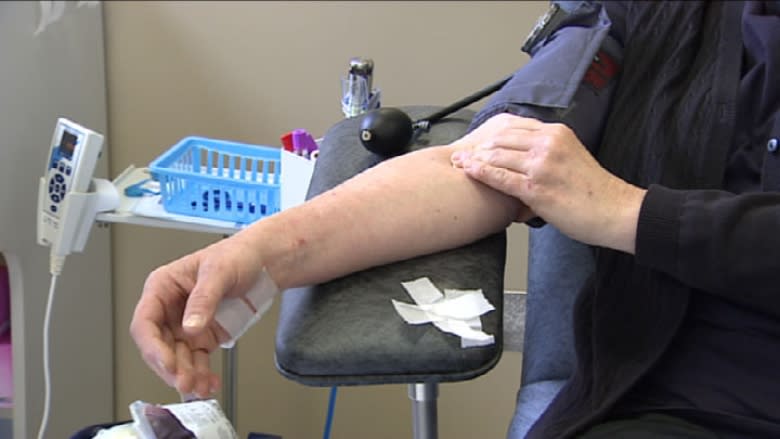 Daily Brew
Daily BrewVancouver clinic offers sexually active gay men a way to join the blood donor system

Gay men who have been sexually active in the last five years are currently not allowed to donate blood in Canada—a controversial deferral that has riled some and inspired others to get involved in other ways.
While sexually active gay men, or MSM (men who have sex with men) as they are known in Canadian Blood Services parlance, remain unable to help address the current blood supply shortage, they are able to help Canadian Blood Services in other ways.
And a Vancouver blood research facility is reaching out to show them how—holding a Rainbow blood donor clinic to promote the fact that sexually active gay men who are not able to donate blood for surgeries or transfusions are still able to donate through them.
The Rainbow Donor Clinic and Open House will be held at the University of British Columbia’s netCAD facility on Feb. 4, between noon and 7 p.m.
“Sexually active gay men can donate there any time. We’re just having an event to celebrate that and raise awareness,” Dr. Tanya Petraszko, associate medical director for West Canadian Blood Services, told Yahoo Canada News.
The deferral of blood donations from gay men stems back to the 1980s, when a tainted blood scandal contaminated the national supply with HIV and Hepatitis C. Since then, testing has become more effective but Health Canada maintains a need for the deferral.
In 2013, however, the ban was somewhat relaxed. Any man who had sex with another man since 1977 was previously denied inclusion in the blood donor process. The threshold was changed to allow any man who hasn’t had sex with another man within the past five years to donate.
Some contend there is no longer a need for any type of ban. And perhaps the Rainbow blood donor clinic could help make that case.
“Health Canada asked Canadian Blood Services to come back at two years and demonstrate that the change in criteria—to five years from lifetime—did not result in an increase in risk,” Petraszko said. “Canada wants us to demonstrate that the residual risk of disease transmission has not changed even though some men have had sex with men since 1977 are now in the blood supply.
“If we engage more of the MSM group at netCAD we can demonstrate to Health Canada even stronger that there is a group of men who really want to donate. Look how many people are excited to help? We can do more research on that blood.”
NetCAD, or the Network Centre of Applied Development, is located at the University of British Columbia and acts as a replica donor clinic—meaning it operates like any other blood collection location. The collected samples, however, are only used for research.
Canadian scientists that need blood samples for their research—to study the effects of adding proteins to red blood cells, for example—can apply to access the netCAD collection.
On top of that, Canadian Blood Services (CBS) uses the supply to test-run new innovations. If new equipment is being considered, or a new process discovered that could improve CBS’s blood distribution abilities, the netCAD supply is used for the trial runs.
The program allows CBS to save donor-approved blood for when it’s needed most.
“If we’re going to bring in a new procedure or a new machine, or do something differently, we first trial it at netCAD and make sure we get all the bugs out,” Petraszko said. “We make our improvements at netCAD before we implement in our facilities across the country.”
“It is vital that we do that,” she added. “We can’t implement a new process unless we know that it is safe. These donors are vital in that regard.”
Petraszko stresses that there is no chance for cross-contamination between the netCAD supply and the donations collected across Canada. Indeed, netCAD has been collecting blood from otherwise unacceptable applicants since 2003.
And it is not just sexually active gay men who are left off the valid blood donor list. Those suffering from various ailments such as malaria, have a history of cancer, have recently travelled overseas, have a new tattoo or fresh piercings are also excluded.
The idea to promote netCAD as a way for sexually active gay men to participate in the blood donor system was the work of Chad Walters, a gay man who discovered the facility after being rejected as a standard donor.
Walters told the Daily Xtra that he felt the ban on blood from sexually active gay men was discriminatory at first, but later studied the reasons behind the deferral.
“I did a lot of research, and through that research I learned a series of things,” he told the news agency. “I see why the deferral is important. One of the key points was the scar in Canada’s history. We’re talking about the tainted blood scandal by transfusion HIV and hep C, so of course there was a resistance to making changes because Canada had to really face some challenges.”
Walters launched the Rainbow blood donor clinic to prove that sexually active gay men wanted to help out, and to promote netCAD as a way to do that. The end result, perhaps, is a reduction of the blood ban from five years to six months.
“There are so many men who are deferred because they have sex with men, but they can donate at nedCAD,” Petraszko said. “Chad’s goal is to promote netCAD and encourage men who have sex with men to donate there.”

